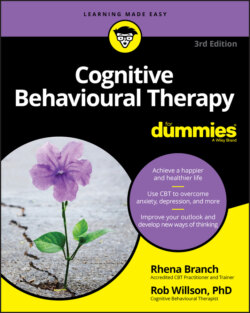Читать книгу Cognitive Behavioural Therapy For Dummies - Rob Willson - Страница 29
Emotional Reasoning: Reminding Yourself That Feelings Aren’t Facts
ОглавлениеSurely we’re wrong about this one. Surely your feelings are real hard evidence of the way things are? Actually, no! Often, relying too heavily on your feelings as a guide leads you off the reality path. Here are some examples of emotional reasoning:
Your partner has been spending long nights at the office with a co-worker for the past month. You feel jealous and suspicious of your partner. Based on these feelings, you conclude that your partner’s having an affair with his co-worker.
You feel guilty out of the blue. You conclude that you must have done something wrong; otherwise, you wouldn’t be feeling guilty.
You wake up feeling anxious, with a vague sense of dread. You assume that there must be something seriously wrong in your life and search your mind frantically for the source of your ill- feeling.
Often your feelings are simply due to a thought or memory that you may not even be totally aware of having had. Other times they can be symptoms of another disorder such as depression or anxiety problems (see Chapter 9 for information about anxiety disorders and Chapter 12 for more on depression). Some of the feelings you experience on waking are left over from dreams that you may or may not remember. As a rule of thumb, it pays to be somewhat sceptical about the validity of your feelings in the first instance. Your feelings can be misleading.
When you spot emotional reasoning taking over your thoughts, take a step back and try the following:
1 Take notice of your thoughts.Take notice of thoughts such as ‘I’m feeling nervous; something must be wrong’ and ‘I’m so angry, and that really shows how badly you’ve behaved’ and recognise that feelings are not always the best measure of reality, especially if you’re not in the best emotional shape at the moment.
2 Ask yourself how you’d view the situation if you were feeling calmer.Look to see if there is any concrete evidence to support your interpretation of your feelings. For example, is there really any evidence that something bad is going to happen?
3 Give yourself time to allow your feelings to subside.When you’re feeling calmer, review your conclusions and remember that it is quite possible that your feelings are the consequence of your present emotional state (or even just fatigue) rather than reliable indicators of the state of reality.
4 If you can’t find any obvious and immediate source of your unpleasant feelings – overlook them.Get into the shower despite your sense of dread, for example. If a concrete reason to be anxious does exist, it won’t get dissolved in the shower. If your anxiety is all smoke and mirrors, you may well find it washes down the drain.
The problem with viewing your feelings as factual is that you stop looking for contradictory information – or for any additional information at all. Balance your emotional reasoning with a little more looking at the facts that support and contradict your views, as we show in Figure 2-5.
© John Wiley & Sons, Inc.
FIGURE 2-5: Emotional reasoning.
